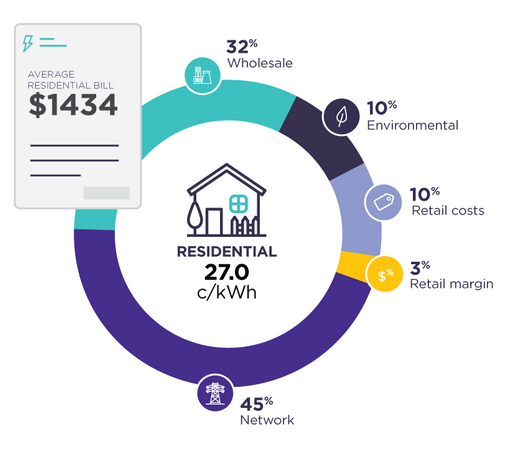Smart Meters are coming
The Australian Energy Market Commission (AEMC) is officially starting its Accelerating Smart Meter Deployment (ASMD) reforms. If you don’t already have a smart meter, you will by the end of 2030.
Energy prices are up, so let's check the rules on when, how often, and by how much retailers can increase their prices. Here's everything you need to know.

Energy is a highly regulated industry, and retail energy price controls are managed by the Essential Services Commission (ESC) in Victoria, and by the Australian Energy Market Operator (AEMO) in other parts of the National Energy Market (NEM), which includes QLD, NSW, ACT, SA and TAS.
Victoria, has the strongest controls on how often price increases can be charged to existing customers. The rest of the NEM does not have the same level of controls in place.
No matter where you're located, your retailer must provide a minimum of five business days notice of any price change.
Has your retailer increased your pricing? If you're a Bill Hero subscriber, you can simply send your price change notice to Bill Hero, and we'll recalculate your most recent bill, based on the new rates in the price change notice. This is the best way to see how the new rates will impact you and your own unique consumption patterns. We'll let you know if there's a better deal out there for you.
If you're not yet a Bill Hero subscriber, then what are you waiting for?

Never overpay for energy again! Bill Hero automatically compares every bill to help keep you always on the best priced plan.
The National Energy Retail Rules govern the sale and supply of energy – including both electricity and natural gas – from retailers and distributors to customers in the NEM. Energy pricing and price change falls under these rules.
Pricing for retail energy contracts is driven by these 5 factors:

Retailers roll up all these costs into the bills they present to you and an energy consumer.
Whenever the price for any of these underlying components changes, it can lead to a retail price change.
Electricity distribution, i.e. the 'poles and wires', is managed as a regulated monopoly, with a single provider for each network territory.
Network prices represent about 45% of an average retail bill, so changes to this bill component will drive changes to retail pricing. Network pricing is controlled by a regulated annual process, with new network pricing coming into effect for every NEM jurisdiction on 1 July each year.
This triggers an annual retail price change for every plan and every retailer, as the retailers adjust their prices to absorb this annual change to one of the key input factors. Many retailers also use the annual July 1 network price change event to modify or completely overhaul their suite of plans.
Wholesale costs, environmental policy costs or retail costs can change at any time of the year, and retail prices can change in response to these costs at any time, so long as the terms of a retail contract allow for this, and provided the consumer is validly notified.
Retailers must provide a minimum five business day notice of any price change.
On 1 July 2020, the ESC introduced 'retail price certainty rules' intended to protect energy consumers in Victoria from unexpected energy price increases. Energy retailers in Victoria are only able to increase prices once a year. They can decrease pricing at any time.
Annual network price changes come into effect on 1 July each year, which is also the date when retailers will publish new pricing to be offered to new customers.
The standard annual price change date for existing variable rate electricity customers in Victoria is one month after the network prices change – on 1 August each year.
Retailers must provide a minimum five business day notice of any price change.
There is some scope for exemption from the price certainty rules, intended to support retailers in offering innovative products that are not compatible with limiting price increases to once a year. Retailers can gain exemption from these rules and increase prices more than once a year in these situations:
An application for an exemption must clearly demonstrate to us that the product is innovative and that:
Standing exemptions allow retailers to offer energy products that do not comply with the price certainty rules in the following circumstances:
Retailers do not need to apply if their product meets one of the above criteria for a standing exemption.
Retailers offering contracts under any of the exemption categories specified above must comply with additional requirements in the Energy Retail Code, including making customers aware when signing up that:
Retailers are also permitted to pass on price increases outside the annual cycle if:
Savings as a Service is the blog site and newsletter from Bill Hero. Subscribe now and get your energy savings tips and information delivered fresh to your inbox every month.